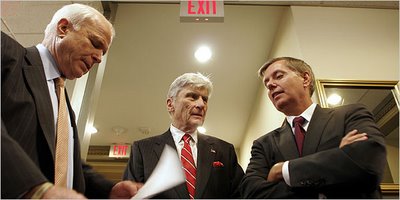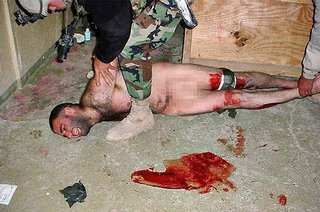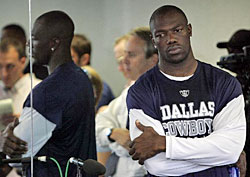Redefining Torture
The military trials bill approved by Congress on Thursday night lends legislative support for the first time to broad rules for the detention, interrogation, prosecution and trials of terrorism suspects far different from those in the familiar American criminal justice system.
President Bush's argument that the government requires extraordinary power to respond to the unusual threat of terrorism helped him win final support for a system of military trials with highly truncated defendant's rights. The United States used similar trials on just four occasions: during the country's revolution, the Mexican-American War, the Civil War and World War II.

Included in the bill, passed by Republican majorities in the Senate yesterday and the House on Wednesday, are unique rules that bar terrorism suspects from challenging their detention or treatment through traditional habeas corpus petitions. They allow prosecutors, under certain conditions, to use evidence collected through hearsay or coercion to seek criminal convictions.
The bill rejects the right to a speedy trial and limits the traditional right to self-representation by requiring that defendants accept military defense attorneys. Panels of military officers need not reach unanimous agreement to win convictions, except in death penalty cases, and appeals must go through a second military panel before reaching a federal civilian court.
By writing into law for the first time the definition of an "unlawful enemy combatant," the bill empowers the executive branch to detain indefinitely anyone it determines to have "purposefully and materially" supported anti-U.S. hostilities. Only foreign nationals among those detainees can be tried by the military commissions, as they are known, and sentenced to decades in jail or put to death.
At the same time, the bill immunizes U.S. officials from prosecution for cruel, inhumane or degrading treatment of detainees who the military and the CIA captured before the end of last year. It gives the president a dominant but not exclusive role in setting the rules for future interrogations of terrorism suspects.
Written largely, but not completely, on the administration's terms, with passages that give executive branch officials discretion to set details or divert from its protections, the bill is meant to provide what Bush said yesterday are "the tools" needed to handle terrorism suspects U.S. officials hope to capture.

For more than 57 months after the 2001 terrorist attacks on the World Trade Center and the Pentagon, Bush maintained that he did not need congressional authorization of such tools. But the Supreme Court decided otherwise in June, declaring the administration's detainee treatment and trial procedures illegal, and ruling that Bush must first seek Congress's approval.
Now Bush has received much of the authority he desired from party loyalists and a handful of Democrats on Capitol Hill. "The American people need to know we're working together," Bush told senators before yesterday's vote.
But Tom Malinowski, the Washington office director for Human Rights Watch, said Bush's motivation is partly to protect his reputation by gaining congressional endorsement of controversial actions already taken. "He's been accused of authorizing criminal torture in a way that has hurt America and could come back to haunt our troops. One of his purposes is to have Congress stand with him in the dock," Malinowski said.
The bill contains some protections unavailable to the eight Nazi saboteurs who came ashore in the United States in 1942 and were captured two weeks later. Six were executed that year after a closed military trial on the fifth floor of Justice Department headquarters. That proceeding was upheld by the Supreme Court in a decision it explained two months after the electrocutions.
Under the new procedures, trials are supposed to be open, but can be closed to protect the security of individuals or information expected to harm national security. Defendants have a right to be present, unless they are disruptive, and a right to examine and respond to the evidence against them. Proof of guilt must exceed a reasonable doubt.
Many constitutional experts say, however, that the bill pushes at the edges of so much settled U.S. law that its passage will not be the last word on America's detainee policies. They predict it will shift the public debate to the federal courts, a forum where the administration has had less success getting its way on counterterrorism policies.
"This is a full-employment act for lawyers," said Deborah Perlstein, who directs the U.S. Law and Security Program at the New York-based nonprofit group Human Rights First.
Former White House associate counsel Bradford A. Berenson, a supporter of the bill and one of the authors of the rules struck down by the Supreme Court, agreed. "Some of the most creative legal minds are going to be devoted to poking holes in this," he said.
Anticipating court challenges, the administration attempted to make the bill bulletproof by including provisions that would sharply restrict judicial review and limit the application of international treaties -- signed by Washington -- that govern the rights of wartime detainees.
The bill also contains blunt assertions that it complies with U.S. treaty obligations.
University of Texas constitutional law professor Sanford V. Levinson described the bill in an Internet posting as the mark of a "banana republic." Yale Law School Dean Harold Koh said that "the image of Congress rushing to strip jurisdiction from the courts in response to a politically created emergency is really quite shocking, and it's not clear that most of the members understand what they've done."
In contrast, Douglas W. Kmiec, a professor of constitutional law at Pepperdine University, said Congress "did reasonably well in terms of fashioning a fair" set of procedures. But Kmiec and many others say they cannot predict how the Supreme Court will respond to the provision barring habeas corpus rights, which he said will leave "a large body of detainees with no conceivable basis to challenge their detentions."
There are other likely flashpoints. In the Supreme Court's June decision overturning previous administration policies, four members of the court who joined the majority opinion said conspiracy is not a war crime. The new bill says it is.
Georgetown University law professor Neal Katyal said the bill's creation of two systems of justice -- military commissions for foreign nationals and regular criminal trials for U.S. citizens -- may violate the Constitution's 14th Amendment, which requires equal protection of the laws to anyone under U.S. jurisdiction.
"If you're an American citizen, you get the Cadillac system of justice. If you're a foreigner or a green-card holder, you get this beat-up-Chevy version," he said.
On Detainee Legal RightsThe Definition of 'Unlawful Enemy Combatant'
The bill expands the definition of unlawful enemy combatants to include people who have "purposefully and materially supported hostilities" and people who have been declared enemy combatants under Combat Status Review Tribunals, "or another competent tribunal established under the authority of the President or the Secretary of Defense." Under this new language, people in the United States who are not American citizens could be declared unlawful enemy combatants and held indefinitely without trial.

Habeas Corpus
The bill prohibits detainees held by the United States from filing lawsuits challenging their detention, known as habeas corpus pleadings. This wipes out both pending and future lawsuits, and it would apply to people picked up anywhere in the world, including the United States.
The provision is significant. Habeas corpus is an ancient protection that stems from English common law, and its use dates back to as early as the 12th century. In 1969, the Supreme Court called it "the fundamental instrument for safeguarding individual freedom against arbitrary and lawless state action." Sen. Arlen Specter (R-PA) introduced an amendment to remove this part of the legislation. He argued that the ability to challenge one's detention is one of the most fundamental rights enshrined in the Constitution. The proposed amendment failed.
On the Geneva Convention
Coercive Interrogation Tactics
The bill prohibits "grave breaches" of Common Article 3 of the Geneva Conventions. That includes "cruel or inhuman treatment." But many legal analysts and government officials believe the definition of cruel or inhuman treatment as written in the bill does not encompass some of the severe interrogation tactics that the CIA has reportedly used against terrorism suspects. The bill also prohibits enemy combatants from filing lawsuits claiming a violation of their rights under the Geneva Conventions. That could make it difficult to hold accountable those who do engage in torture.
Presidential Power
The bill gives the president the power to "interpret the meaning and application of the Geneva Conventions." Critics fear this means that the president can unilaterally authorize interrogation techniques that many people would consider torture.
War Crimes Act
The legislation would narrow the range of offenses prohibited under the War Crimes Act. This would protect civilians (such as CIA interrogators and White House officials) from being prosecuted for committing acts that would have been considered war crimes under the old definition. The change is retroactive to 1997, which means any crimes committed since 1997 would be prosecuted under the new standard, not the old one.
On Military Commisions
Evidence Obtained Through Coercion
If an enemy combatant made a statement under coercion before Congress passed the Detainee Treatment Act in 2005, the evidence is admissible at a military tribunal in most cases. If the statements were made after Congress passed the 2005 ban on coercive interrogation tactics, the evidence is admissible only if a military judge finds that "the interrogation methods used to obtain the statement do not violate the cruel, unusual, or inhumane treatment or punishment prohibited by the Fifth, Eighth, and Fourteenth Amendments to the Constitution."
Secret Evidence
The first draft of this legislation said that defendants could "examine and respond" to all of the evidence against them at a military tribunal. Now it says only that defendants can "respond" to all evidence. The full implications of this phrase aren't entirely clear. Defense lawyers will likely argue that defendants can't respond to evidence they haven't been able to examine.
Hearsay Evidence
Hearsay evidence is generally acceptable at military tribunals. A judge has to rule that the evidence is reliable and relevant to the trial.




